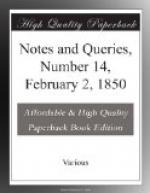Skelton, the rhymer, has parker for park-keeper, so that parkership is an admissable word; but I reject it on this occasion, as inapplicable to a forest or chace. I incline to believe that pokership is the true lection. Poke denoted a purse; witness Chaucer:—
“Gerveis answered; Certes, were
it gold,
Or in a poke nobles all untold,
Thou shuldest it have.”—C.T.
v. 3777.
We do not find poker in Barret or Cotgrave; but if poke denoted a purse, poker might denote a purse-bearer or treasurer, and pokership, the office of purse-bearer. So we have BURSA, [Glossarivm manvale, 1772. I. 849.] bursar, bursarship, etc.
BOLTON CORNEY.
* * * * *
MERTENS, MARTINS, OR MARTINI, THE PRINTER.
A correspondent, “W.,” in No. 12. p. 185., wishes to learn “the real surname of Theodoric Mertens, Martins, or Martini, the printer of Louvain.”
In Latin the name is written Theodoricus Martinus; in French, Thierri Martin; in Flemish, Diedrych Meertens, and occasionally, but I think incorrectly, Dierix Martens.
In a side chapel of the chancel of the church at Alost, midway between Brussels and Ghent, is the printer’s tomb, and a double inscription, in Latin and in Flemish, commemorates his celebrity and the dates of his birth and death; in the Latin inscription the name is Theodoricus Martinus; in the Flemish, which is very old and nearly effaced, it is Diedrych Meertens.
The name of Meertens, as a surname, is as common in Brabant and Flanders as that of Martin with us.
A.B.
* * * * *
I beg to say that, in Peignot’s Dictionnaire raisonne de Bibliologie, the name of the printer Mertens is given as “Martens, Mertens, ou Martin d’Alost (Thierry), en Latin Theodoricus Martinus.” The article is too long for insertion in your pages, but it contains an account of the title-page of one of his editions, in 4to., in which the name is spelt Mertens:—“Theo. Mertens impressore.” Two other title-pages have “Apud Theod. M_a_rtinum.” So it appears that the printer himself used different modes of spelling his own name. Erasmus wrote a Latin epitaph on his friend, in which a graceful allusion is made to his printer’s mark, the anchor:—
“Hic Theodoricus jaceo, prognatus
Alosto:
Ars erat impressis scripta referre typis.
Fratribus, uxori, soboli, notisque superstes
Octavam vegetus praeterii decadem.
Anchora sacra manet, gratae notissima
pubi:
Christe! precor nunc sis anchora sacra
mihi.”
HERMES.
* * * * *
ETYMOLOGY OF ARMAGH.
In reply to the inquiry of “D.S.Y.” (p. 158. of your 10th number), I beg to say that the name of Armagh is written, in Irish, Ardmacha, and signifies the Height (or high ground) of Macha. It is supposed to have derived this name from Macha Mong-ruadh [i.e. Macha of the red hair], who was queen of Ireland, according to the Chronology of O’Flaherty, A.M. 3603.




